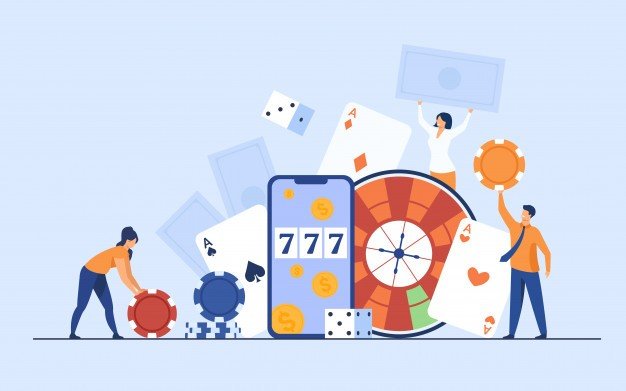Covid has driven many organizations and industries into unknown waters with unclear futures, making 2021 a dynamic period for the global economy.
However, the iGaming industry is experiencing a renaissance. It is predicted to skyrocket in the next years, with new opportunities for business and enjoyment clearly evident on the horizon. With these opportunities, shockwaves are being sent throughout the US, as many more states propose new gambling laws in an attempt to change the stagnant legislation that now outlaws various types of gambling in the US.
The present growth rate for regulated sports betting in the United States supports the notion that states have both an audience and a financial incentive to accept the practice. However, sportsbooks have far lower profit margins, and legislators soon recognize that taxable revenue from virtual casinos might dwarf that of sports wagering marketplaces.
More than half of the country has begun to legalize betting.

In May 2018, the United States Supreme Court issued a landmark decision to legalize sports betting across the country. Prior to that, the federal prohibition on sports betting meant that Americans wagered an estimated $150 billion illegally each year, and the subject of unregulated gambling remains a contentious subject.
After years of pushing for the legalization of sports betting, New Jersey presented the case to the Supreme Court for the first time. Finally, after being deemed unlawful, the federal ban on sports betting was repealed, allowing individual states to establish and regulate their own body of sports betting services. Since then, sportsbooks have sprouted up all across the country.
This is a significant step forward for the entertainment industry in the United States, and as more states open legislative doors, brands from around the world are showing an increased interest in broadening their horizons and pushing into the American market, with British brands already discussing strategies to enter the American market.
All big sportsbook operators have either partnered with or been significantly impacted by the huge UK businesses since they offer years of knowledge and extensive technology to manage the business,” explained an Online Slots UK official.
When it comes to the world of casinos online, this reliance will be even larger. The European businesses already have vast gaming catalogs supported by the world’s leading software providers, and their CRM models and incentive programs have been fine-tuned.

In a rush to be the first to market with the best product, it appears likely that established gambling brands in the United States may seek to collaborate with or purchase these existing operators.
Uphill Struggle
While the legislation would plainly provide financial benefits to states in the form of job creation and taxable revenue, virtual versions of casino gambling continue to attract significant opposition. So let’s have a look at some facts:
- Utah and Hawaii are the only states that now prohibit all forms of commercial gambling, both online and off. However, in Hawaii, poker is allowed in private households.
- In the United States, there are two types of land-based casinos: commercial casinos and Native Tribe casinos.
- Nevada and Atlantic City both have commercial casinos.
- There are 524 Native Tribal Casinos in 30 states around the US. In most states, these casinos are not subject to federal oversight and operate under their own set of rules.
- There are no land-based or tribal casinos in Georgia, Hawaii, Kentucky, New Hampshire, South Carolina, Utah, Vermont, or Virginia.
- Internet gambling is legal in Delaware, California, Illinois, Indiana, Nevada, Iowa, New Hampshire, Pennsylvania, New Jersey, Rhode Island, and West Virginia. Players in other states access websites licensed by other countries.
- Online gambling is theoretically illegal in Louisiana, Utah, and Washington, yet no one has ever been convicted.
- The Unlawful Internet Gambling Enforcement Act (UIGEA) is a federal law that prohibits banks from making payments to online gambling companies. This is somewhat at odds with the fact that online gambling is legal in some states.
Many people have not warmed up to the idea of online casino-style gambling, but this opposition roughly resembles the hostility that the sports betting campaign faced only a few years ago.

One of the most rapidly expanding industries
IGaming refers to any online betting activity, such as betting on a live event or game outcome. This time-honored practice is now carried out through sports betting, online casino gambling, and other skill-based games such as poker or blackjack.
“According to data, there are about 400 registered casino hotels in the United States, with a total estimated worth of $54.8 billion this year. In 2019, the 465 registered non-hotel casinos recorded gross gaming revenue of slightly more than $43 billion. “There is a lot of interest,”
According to one online casino operator.
“The United States generated $34.3 billion in total gross gaming income in 2009, implying that interest and cash flow had nearly tripled in a ten-year period.”
The expansion of the iGaming industry could be attributed to a variety of factors. Because of technological advancement, games are always evolving and improving. All types of betting services are now available with an improved visual and aural design, which naturally draws in more clients.
IGaming is a highly inventive industry that never sleeps, and the online casino business is at the forefront. Every week, new online slots are released, and they quickly gain a large public following. Meanwhile, classic games like roulette and blackjack continue to attract a large number of players.
A complete system overhaul utilizing Blockchain?
Blockchain would eliminate the need for a central authority (an escrow service/third-party corporation that processes bets). Instead, Blockchain enables all bets to be documented, saved and processed across a network of computers. It will produce a clear record that cannot be tampered with. All parties engaged in the transaction can examine and verify this record.

The implications of this technology are enormous since it would bring a new degree of trust and openness to the way gambling is conducted and the handling of client complaints. Many people believe that Blockchain will be the driving force towards the legalization of online casino gambling in all 50 states.
If Blockchain penetrates the betting industry, cryptocurrency is also likely to become a legal means of payment. This would offer up a plethora of new avenues for collaboration and expansion of the iGaming industry’s reach.
Is There a Future Worth Betting On?
The iGaming industry is a potential niche that is predicted to change. These reforms have a lot of promise for business since citizens in the United States are looking forward to more transparent and safe betting options.
Given how large, innovative, and creative the iGaming industry is, it is just a matter of time until it becomes more generally legal in the United States. This is not a question of if, but of when: Blockchain technology may hold the secret to be legal and safe online casino gambling.
Many Americans like online casino games, while others are unable to do so due to existing regulations. Regardless, the iGaming industry’s future appears bright since gambling restrictions are being loosened. The best AU online casinos are expected to follow in the footsteps of sportsbooks, as the dollar signs linked appear to be too enticing for legislators to ignore.

